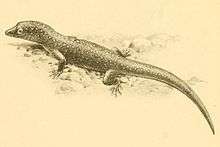Sphaerodactylus argus
The ocellated gecko, ocellated sphaero, or stippled sphaero, (Sphaerodactylus argus) is a species of gecko found in the Caribbean.
- For the African species called ocellated gecko, see Pachydactylus geitje
| Ocellated gecko | |
|---|---|
 | |
| Scientific classification | |
| Kingdom: | Animalia |
| Phylum: | Chordata |
| Class: | Reptilia |
| Order: | Squamata |
| Family: | Sphaerodactylidae |
| Genus: | Sphaerodactylus |
| Species: | S. argus |
| Binomial name | |
| Sphaerodactylus argus | |
Etymology
The specific name, argus, refers to Argus, the many-eyed giant in Greek mythology, an allusion to the ocelli (eye spots) of this species.[3]
Geographic range
S. argus is native only to Tobago and is mainly found in Main Ridge Forest Reserve.[4] It is also found in Cuba and Hispaniola. The ocellated gecko can be found in the Florida Keys, where it has well-established populations, though it was not native there.
Habitat
Sphaerodactylus argus is a climbing species, and it can also be seen in buildings.
Diet
The ocellated gecko feeds on insects and other small invertebrates.
gollark: Yep!
gollark: Note that I could of course be faking it.
gollark: Yes.
gollark: I *think* the first mention of apioforms was in direct messages between me and heavpoot about a week before andrew said it.
gollark: UTF-64 *when*?
References
- Caicedo, J.R., Lee, J., Mandujano, R.C., Wilson, B.S., Hedges, B. & Fong, A. 2017. Sphaerodactylus argus. The IUCN Red List of Threatened Species 2017: e.T198439A2526550. https://doi.org/10.2305/IUCN.UK.2017-2.RLTS.T198439A2526550.en. Downloaded on 26 February 2019.
- Gosse PH (1850). "Description of a new genus and six new species of Saurian Reptiles". Ann. Mag. Nat. Hist., Second Series 6: 344-348. ("Sphærodactylus Argus ", new species, p. 347).
- Beolens, Bo; Watkins, Michael; Grayson, Michael (2011). The Eponym Dictionary of Reptiles. Baltimore: Johns Hopkins University Press. xiii + 296 pp. ISBN 978-1-4214-0135-5. (Sphaerodactylus argus, p. 11).
- Schwartz A, Thomas R (1975). A Check-list of West Indian Amphibians and Reptiles. Carnegie Museum of Natural History Special Publication No. 1. Pittsburgh, Pennsylvania: Carnegie Museum of Natural History. 216 pp. (Sphaerodactylus argus, p. 144).
External links
This article is issued from Wikipedia. The text is licensed under Creative Commons - Attribution - Sharealike. Additional terms may apply for the media files.
